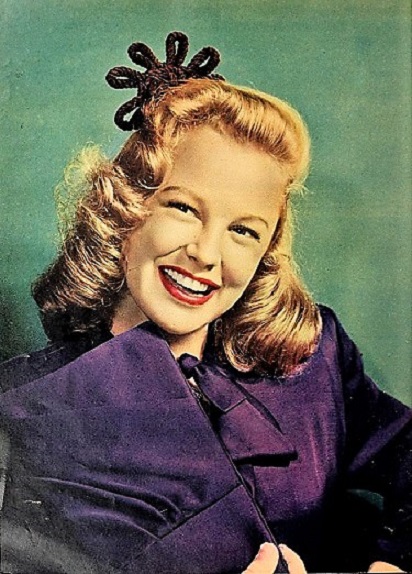|
That's Entertainment! III
''That's Entertainment! III'' is a 1994 American compilation film released by Metro-Goldwyn-Mayer to celebrate the studio's 70th anniversary. Unlike the prior retrospectives ''That's Entertainment!'' (1974) and ''That's Entertainment, Part II'' (1976), the third installment "focuses on outtakes, unfinished numbers and behind-the-scenes glimpses of the old musicals." Hosts for the film were Gene Kelly (in his last film appearance), June Allyson, Cyd Charisse, Lena Horne, Howard Keel, Ann Miller, Debbie Reynolds, Mickey Rooney, and Esther Williams, making her first appearance in a theatrical film in more than 30 years. ''That's Entertainment! III'' had a limited theatrical release in 1994. According to film historian Robert Osborne, writing for ''The Hollywood Reporter'' at the time, the film did "pleasant business" at New York's Ziegfeld Theatre. Reception Writing in ''The New York Times'', film critic Caryn James called the film "a lively and funny compilation of curiositi ... [...More Info...] [...Related Items...] OR: [Wikipedia] [Google] [Baidu] |
June Allyson
June Allyson (born Eleanor Geisman; October 7, 1917 – July 8, 2006) was an American stage, film, and television actress. Allyson began her career in 1937 as a dancer in short subject films and on Broadway in 1938. She signed with MGM in 1943, and rose to fame the following year in '' Two Girls and a Sailor''. Allyson's "girl next door" image was solidified during the mid-1940s when she was paired with actor Van Johnson in six films. In 1951, she won the Golden Globe Award for Best Actress for her performance in ''Too Young to Kiss''. From 1959 to 1961, she hosted and occasionally starred in her own anthology series, '' The DuPont Show with June Allyson'', which aired on CBS from 1959 to 1961. In the 1970s, she returned to the stage, starring in '' Forty Carats'' and '' No, No, Nanette''. In 1982, Allyson released her autobiography ''June Allyson by June Allyson'', and continued her career with guest starring roles on television and occasional film appearances. She later es ... [...More Info...] [...Related Items...] OR: [Wikipedia] [Google] [Baidu] |
Robert Osborne
Robert Jolin Osborne (; May 3, 1932 – March 6, 2017) was an American film historian, author, actor and the primary television host for the premium cable channel Turner Classic Movies (TCM) for over twenty years. Prior to hosting at TCM, Osborne had been a host on The Movie Channel. He had also worked as a news columnist for ''The Hollywood Reporter''. Osborne wrote the official history of the Academy Awards, with the first edition published in 1988. Early life Osborne was born on May 3, 1932, in Colfax, Washington. His parents were Robert Eugene Osborne, a public school teacher, and Hazel Ida (''née'' Jolin). In 1941, Osborne's fascination with Hollywood began when his mother purchased for him the August edition of ''Modern Screen'' magazine featuring Lana Turner; inside, there was an advertisement for ''Kiss the Boys Goodbye'', in which Mary Martin's lips were colored red in a black-and-white spread. At twelve years old, he landed a summer job at the Rose Theatre, where ... [...More Info...] [...Related Items...] OR: [Wikipedia] [Google] [Baidu] |
Compilation Films
A compilation film, or compilation movie is a film composed of scenes and shots taken from two or more prior films or television programs and edited together so as to make a new film, whether on the same or a different subject. The most common example would be a documentary film on an historical event composed of footage from various newsreels and other film documentaries on the same subject. New footage and/or a new soundtrack may also be included in a compilation film, but the compiled, older footage makes up the majority of its principal material. Compilation film does not include, however, a simple editing together of several short films, complete in themselves and distinguished as such from each others, which should be considered as film anthologies. Filmmaker and historian Jay Leyda first coined the term "Compilation Film" in his book ''Films Beget Films'' in 1964, but it appears that there have not been active discussions around the topic since. This could be due to the ... [...More Info...] [...Related Items...] OR: [Wikipedia] [Google] [Baidu] |
Documentary Films About Hollywood, Los Angeles
A documentary film (often described simply as a documentary) is a nonfiction motion picture intended to "document reality, primarily for instruction, education or maintaining a historical record". The American author and media analyst Bill Nichols has characterized the documentary in terms of "a filmmaking practice, a cinematic tradition, and mode of audience reception hat remainsa practice without clear boundaries". Research into information gathering, as a behavior, and the sharing of knowledge, as a concept, has noted how documentary movies were preceded by the notable practice of documentary photography. This has involved the use of singular photographs to detail the complex attributes of historical events and continues to a certain degree to this day, with an example being the conflict-related photography achieved by popular figures such as Mathew Brady during the American Civil War. Documentary movies evolved from the creation of singular images in order to convey pa ... [...More Info...] [...Related Items...] OR: [Wikipedia] [Google] [Baidu] |
Metro-Goldwyn-Mayer Films
This is a list of feature films originally released and/or distributed by Metro-Goldwyn-Mayer (to include MGM/UA Entertainment Co., MGM/UA Communications Co., MGM-Pathe Communications Co. and MGM/UA Distribution Co.). This list does not include films from United Artists before it merged with MGM (except for co-productions), or other studios that MGM acquired (such as Orion Pictures, The Samuel Goldwyn Company, and Cannon Films). MGM's pre-May 1986 library is currently owned by Warner Bros. through Turner Entertainment Co. Lists The films are divided into lists by decade: * List of Metro-Goldwyn-Mayer films (1924–1929) * List of Metro-Goldwyn-Mayer films (1930–1939) * List of Metro-Goldwyn-Mayer films (1940–1949) * List of Metro-Goldwyn-Mayer films (1950–1959) * List of Metro-Goldwyn-Mayer films (1960–1969) * List of Metro-Goldwyn-Mayer films (1970–1979) * List of Metro-Goldwyn-Mayer films (1980–1989) * List of Metro-Goldwyn-Mayer films (1990–19 ... [...More Info...] [...Related Items...] OR: [Wikipedia] [Google] [Baidu] |
Documentary Films About Films
A documentary film (often described simply as a documentary) is a nonfiction motion picture intended to "document reality, primarily for instruction, education or maintaining a historical record". The American author and media analyst Bill Nichols has characterized the documentary in terms of "a filmmaking Filmmaking or film production is the process by which a Film, motion picture is produced. Filmmaking involves a number of complex and discrete stages, beginning with an initial story, idea, or commission. Production then continues through screen ... practice, a cinematic tradition, and mode of audience reception [that remains] a practice without clear boundaries". Research into information gathering, as a behavior, and the sharing of knowledge, as a concept, has noted how documentary movies were preceded by the notable practice of documentary photography. This has involved the use of singular Photograph, photographs to detail the complex attributes of History, historica ... [...More Info...] [...Related Items...] OR: [Wikipedia] [Google] [Baidu] |
American Musical Films
American(s) may refer to: * American, something of, from, or related to the United States of America, commonly known as the "United States" or "America" ** Americans, citizens and nationals of the United States of America ** American ancestry, people who self-identify their ancestry as "American" ** American English, the set of varieties of the English language native to the United States ** Native Americans in the United States, indigenous peoples of the United States * American, something of, from, or related to the Americas, also known as "America" ** Indigenous peoples of the Americas * American (word), for analysis and history of the meanings in various contexts Organizations * American Airlines, U.S.-based airline headquartered in Fort Worth, Texas * American Athletic Conference, an American college athletic conference * American Recordings (record label), a record label that was previously known as Def American * American University, in Washington, D.C. Sports teams S ... [...More Info...] [...Related Items...] OR: [Wikipedia] [Google] [Baidu] |
1994 Documentary Films
The year 1994 was designated as the "International Year of the Family" and the "International Year of Sport and the Olympic Charter, Olympic Ideal" by the United Nations. In the Line Islands and Phoenix Islands of Kiribati, 1994 had only 364 days, omitting December 31. This was due to an adjustment of the International Date Line by the Kiribati government to bring all of its territories into the same calendar day. Events January * January 1 ** The North American Free Trade Agreement (NAFTA) is established. ** Beginning of the Zapatista uprising in Mexico. * January 8 – ''Soyuz TM-18'': Valeri Polyakov begins his 437.7-day orbit of the Earth, eventually setting the world record for days spent in orbit. * January 11 – The Irish government announces the end of a 15-year broadcasting ban on the Provisional Irish Republican Army and its political arm Sinn Féin. * January 14 – U.S. President Bill Clinton and Russian President Boris Yeltsin sign the Kremlin accords, which ... [...More Info...] [...Related Items...] OR: [Wikipedia] [Google] [Baidu] |
1994 Films
This is a list of films released in 1994. The top worldwide grosser was '' The Lion King'', becoming the highest-grossing animated film of all-time, although it was slightly overtaken at the North American domestic box office by ''Forrest Gump'', which won the Academy Award for Best Picture. The year is considered to be one of Hollywood's best years for cinema during the post-Golden Age era, setting the standard for the movies of the modern age. Also in 1994, Metro-Goldwyn-Mayer celebrated its 70th anniversary. Highest-grossing films The top 10 films released in 1994 by worldwide gross are as follows: Events *February 15 - Viacom acquired 50.1% of Paramount Communications Inc. for $9.75 billion, following a five-month battle with QVC. *March 4 - Actor John Candy dies of a heart attack at the age of 43 while on location in Durango, Mexico for the film '' Wagons East''. *March 21 - Steven Spielberg wins his first Academy Award for Best Director for '' Schindler's List'' ... [...More Info...] [...Related Items...] OR: [Wikipedia] [Google] [Baidu] |
List Of American Films Of 1994
This is a list of American films released in 1994. Box office The highest-grossing American films released in 1994, by domestic box office gross revenue, are as follows: January–March April–June July–September October–December See also * List of 1994 box office number-one films in the United States * 1994 in the United States References External links * {{DEFAULTSORT:American films of 1994 1994 Films A film, also known as a movie or motion picture, is a work of Visual arts, visual art that simulates experiences and otherwise communicates ideas, stories, perceptions, emotions, or atmosphere through the use of moving images that are gen ... Lists of 1994 films by country ... [...More Info...] [...Related Items...] OR: [Wikipedia] [Google] [Baidu] |
Roger Ebert
Roger Joseph Ebert ( ; June 18, 1942 – April 4, 2013) was an American Film criticism, film critic, film historian, journalist, essayist, screenwriter and author. He wrote for the ''Chicago Sun-Times'' from 1967 until his death in 2013. Ebert was known for his intimate, Midwestern writing style and critical views informed by values of populism and humanism. Writing in a prose style intended to be entertaining and direct, he made sophisticated cinematic and analytical ideas more accessible to non-specialist audiences. Ebert endorsed foreign and independent films he believed would be appreciated by mainstream viewers, championing filmmakers like Werner Herzog, Errol Morris and Spike Lee, as well as Martin Scorsese, whose first published review he wrote. In 1975, Ebert became the first film critic to win the Pulitzer Prize for Criticism. Neil Steinberg of the ''Chicago Sun-Times'' said Ebert "was without question the nation's most prominent and influential film critic," and Kenne ... [...More Info...] [...Related Items...] OR: [Wikipedia] [Google] [Baidu] |





